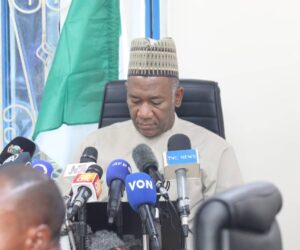The World Health Organisation (WHO) has warned that antimicrobial resistance (AMR) remains a silent but escalating threat, claiming more than 60,000 lives in Nigeria every year.
According to WHO estimates, the country has recorded this burden annually since 1990, noting how deeply rooted the problem has become.
In 2021 alone, Nigeria recorded an estimated 50,500 deaths directly attributable to AMR and 227,000 associated deaths, with children under five bearing the heaviest toll.
In a message to commemorate the 2025 World AMR Awareness Week, WHO Representative and Head of Mission to Nigeria, Pavel Ursu, described AMR as a rapidly evolving public health emergency that disproportionately harms lower- and middle-income countries and vulnerable populations.
Mr Ursu noted that the phenomenon is already undermining health systems, increasing healthcare costs and threatening food security, environmental stability and sustainable development.
Outbreaks of multidrug-resistant infections, he added, remain widespread in settings with poor infection prevention and control, particularly among children and other at-risk groups in communities and hospitals.
What is AMR?
AMR is the ability of microorganisms, such as bacteria, viruses, fungi and parasites, to survive and grow despite exposure to medicines designed to kill them or stop their growth.
When these microorganisms become resistant, antimicrobial medicines, including antibiotics, antivirals, antifungals and antiparasitic drugs, no longer work effectively, making infections significantly harder to treat.
AMR develops gradually, often due to the misuse or overuse of antimicrobial medicines, poor infection prevention practices, and the spread of resistant strains across communities, healthcare facilities, food systems, and the environment.
Global burden
Citing global estimates, Mr Ursu said antimicrobial resistance was associated with 4.71 million deaths in 2021, including 1.14 million directly attributable to drug-resistant infections.
He noted that Sub-Saharan Africa alone, recorded about 250,000 deaths in the same year.
He added that the world loses an estimated 178 million disability-adjusted life years (DALYs) to AMR, and projections indicate the crisis could cost the global economy nearly $1 trillion annually if left unchecked.
Recent modelling also shows that AMR could claim up to 39 million lives by 2050.
Given these trends, Mr Ursu emphasised the urgent need to integrate AMR surveillance and control into primary healthcare, alongside broader initiatives focused on food security, climate action, and universal health coverage.
Call to action
World AMR Awareness Week (WAAW) is celebrated on 18–24 November annually, to raise awareness of AMR and promote best practices to prevent its spread.
The 2025 WAAW is themed “Act Now: Protect Our Present, Secure Our Future.”
This year’s event provides an opportunity for governments and stakeholders to renew commitments made at the 2024 UN General Assembly High-level Meeting on AMR, as well as ahead of the 5th Global High-level Ministerial Conference on AMR, which Nigeria will host in Abuja in 2026.
Mr Ursu urged policymakers, civil society groups, healthcare providers, veterinarians, farmers, environmental actors and the public to translate political commitments into tangible, accountable, life-saving interventions.
Strengthening surveillance, access and innovation
Mr Ursu called for long-term investment in AMR prevention and control, including enhanced One Health surveillance, a national AMR survey, improved access to quality medicines and diagnostics, and stronger support for research and innovation.
READ ALSO: Health ministry, ICPC sign agreement to boost transparency in PHCs
He emphasised that strengthened health systems, supported by sustainable domestic financing, are crucial to delivering an effective AMR response.
Every action, he explained, contributes to reducing antimicrobial resistance, whether through hospital administrators establishing antimicrobial stewardship teams or farmers adopting sustainable waste management practices.
Mr Ursu noted that investing in AMR action is a smart and essential step, warning that failure to act now will undermine future health and development gains.
He stressed that everyone has a role to play, from shaping policy and delivering care to protecting ecosystems and raising awareness, and reiterated that acting now to safeguard the present and secure the future is a shared responsibility.
He added that collective effort will help Nigeria preserve the effectiveness of antimicrobial medicines and build a healthier, more sustainable future for generations to come.










